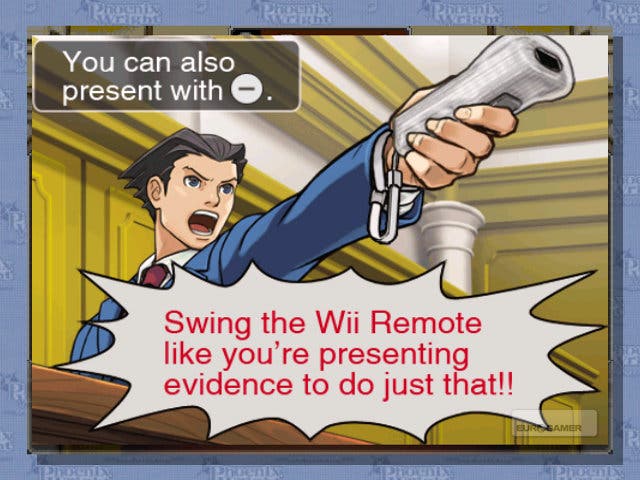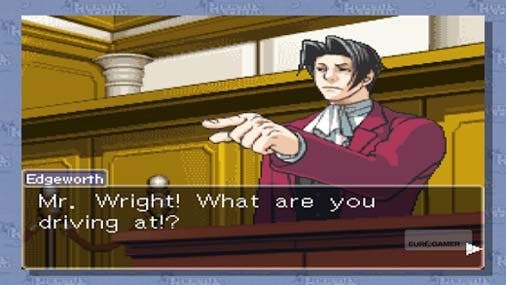Phoenix Wright: Ace Attorney
Justice for all?
While I don't expect anybody to have much sympathy for someone who gets paid to play videogames, this sort of review is very difficult to write. Not only is it a game that has already been lavished with praise in the past, developing a vociferous fanbase along the way, but it's also one of those games where your reaction to this particular version depends largely on prior exposure. If you've never played Phoenix Wright: Ace Attorney then this WiiWare edition is easy to recommend. If, however, you're familiar with the original game then you'll be excused for recoiling slightly at the rather shameless shovelware treatment the magnificently coiffured legal eagle receives here.
For that first group, let's recap. Phoenix Wright is what you get when the traditional western adventure game gets squished through the sieve of Japanese RPGs, with everything apart from the conversational cut-scenes removed. It's a deliciously daft courtroom drama in which you quiz suspects and witnesses, assemble evidence and then look for the contradictions in dubious testimony as you try to solve four outlandish murder mysteries.
The style is silly, the humour broad and scant attention is paid to such trifling matters as judicial procedure. The dialogue is razor-sharp and laugh-out-loud funny, which is just as well, since that's pretty much all the game is: a series of conversations with bizarre characters, told entirely in text accompanied by that burble-burble noise that all JRPGs use to fill the aural void as characters banter back and forth.

It's also a game that began life in 2001 on the Game Boy Advance before being ported to the DS four years later, where it found its cult status. In leaping from GBA to DS, several notable improvements were made, not least an additional fifth episode to add to the four existing stories and stylus control.
For its second hardware shift, the improvements are, well, non-existent. This is the DS game blown up to TV size, right down to the way the view pulls back to accommodate a bottom screen that is no longer required. The only concession to Phoenix's new home is the ability to thrust the remote into the air to present evidence. While minor in nature (you can still press a button) it's a tweak that is certainly a lot of fun and it fits in well with the exuberant style of the game.
But that's it. Despite appearing in the WiiWare channel, this would more accurately belong in the Virtual Console line-up, since you're effectively paying to emulate an old DS cartridge. You're paying a lot less than the cartridge costs, which is good, but the fact that this great game has received only minimum attention in its latest port remains irksome.

There's one information screen, showing how to use the remote, which is crisp and cartoony. The pixellated graphics aren't bad by any stretch of the imagination, and veteran gamers may find they even add a lovable old school charm to the proceedings, but it's the one area where improvements would have been notable, so their unaltered state is a shame. With LucasArts willing to go the extra mile in completely revamping Monkey Island for console downloaders, it's a bit cheeky that Capcom has made virtually no effort at all.
Of course, newcomers to the series probably won't mind (or even notice) the lazy port, and since this release is clearly aimed at them it would be silly to make too big a deal out of it. Less forgivable is the decision to remove that extra fifth episode and make it available as paid-for downloadable content, so a welcome bonus for DS owners becomes a microtransaction for the Wii player. Truly, Capcom giveth and Capcom taketh away. The price of the episode is low - just 100 Nintendo Points - but that makes the decision even harder to swallow. Why risk alienating existing fans, and potential new ones, for such a paltry amount?
But, still, it's Phoenix Wright. Not a game for everyone, and certainly not for those who crave constant action or harbour deep-seated resistance to goofy anime styling, but a game every open-minded gamer should experience. If you're on a budget, or just don't have access to a DS, then this is a fine way to sample its abundant charms, provided you don't expect anything special in the presentation department. As a showcase of how Capcom plans to deploy its cult classics in the download era, however, it's less than convincing. Objection overruled, for now.




